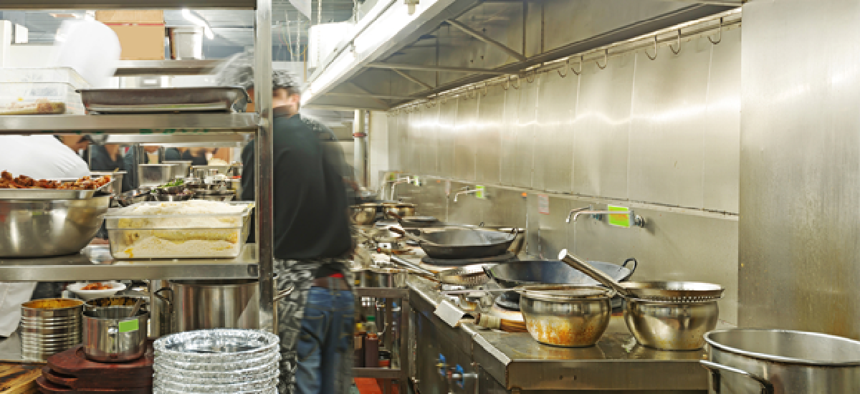Cities tap Yelp to improve health inspection process


Connecting state and local government leaders
Restaurant hygiene inspection data on Yelp is helping city health inspectors better target offenders and pushing restaurants to clean up their act.
Not only is Yelp helping people find great restaurants, it’s also helping health inspectors target offenders and pushing restaurants to clean up their act.
Today, cities such as Los Angeles, San Francisco, Evanston, Ill., and Raleigh, N.C. have health sanitation scores posted on Yelp.
One of the first initiatives began in 2012, with Yelp partnering with San Francisco and New York City to develop the Local Inspector Value-Entry Specification, an open data standard developed by Code for America that allows municipalities to publish restaurant inspection information to Yelp. The partnership was announced in January 2013 by San Francisco Mayor Ed Lee.
Yet, due to technology issues, not every city has been able to post scores. In fact, based on research from cloud solutions provider Socrata, a majority of U.S. cities do not yet publish restaurant inspections, nor do they collect it in a digital-friendly format, reported Government Technology. Most of the information is in PDFs or Excel documents, said Ian Kalin, Socrata’s director of open data.
To address the issue, Socrata recently announced a partnership with Yelp to use Socrata’s Open Data Portal for governments to connect restaurant inspection data to Yelp. As part of the deal, Yelp will become a member of Socrata’s Open Data Network, enabling Socrata government customers to link data in Socrata’s Open Data Network to Yelp’s LIVE open data format.
In addition, Socrata will be offering free tech support to help its government clients transition its data to a friendlier, more accessible format via open data portals and application programming interfaces. San Francisco, a Socrata customer, is already using Socrata technology to post reviews on Yelp.
Yelp is not only on the receiving end of health data. Yelp, along with other review sites, could be used to help health departments better use their resources by narrowing the search for violators. Yelp averaged 139 million unique visitors in the third quarter of 2014, demonstrating that the site is a goldmine of information for those seeking restaurant reviews.
Today inspections are random, “which means time is often wasted on spot checks at clean, rule-abiding restaurants,” said authors Michael Luca, an assistant professor at Harvard Business School, and Luther Lowe, director of public policy at Yelp, in a Harvard Business Review article.
Researchers developed an algorithm that analyzed merged Yelp review and ratings data (looking for words such as ““dirty” and “made me sick,” for example) with hygiene violation data. The HBR study found that the model could correctly classify more than 80 percent of restaurants into either the top half or bottom half of hygiene scores using only Yelp text and ratings.
Yelp data “can predict the likelihood of finding problems at reviewed restaurants. Thus inspectors can be allocated more efficiently,” concluded Luca and Lowe.
One city – Chicago – is already using predictive analytics to determine which restaurants are most prone to health violations and which to focus inspections on based on potential violators rather than random checks. Chicago CIO Brenna Berman and Chief Data Officer Tom Schenk completed a pilot program in February to analyze more than 15,000 restaurants in Chicago and its surrounding neighborhoods for potential violations, according to Government Technology. The team used data from Chicago’s WindyGrid data repository with help from data scientists from AllState Insurance and combined it with data sets from the city’s SmartData analytics platform.
The city analyzed information such as the age of the restaurant, previous inspection scores, data from sanitation complaints and the occurrence of property-based crimes.
Its ultimate goal is to replicate the process in other municipalities. Chicago’s Department of Innovation and Technology, led by Berman, is developing WindyGrid as a free, downloadable open source platform, reported Government Technology. The estimated total cost of the project is $3 million, $1 million of which comes from a grant from Bloomberg Philanthropies Mayor’s Challenge and other funding generated by the city. Chicago would like to release WindyGrid’s code via Github and other outlets in the fall so it can be used by other government agencies.
In addition to improving public health via awareness and improved inspection efforts, there is yet a third way the data can be used – by the restaurants themselves.
Lowe suggested in a February blog that the project could help end food poisoning by embarrassing restaurants into improving their sanitary conditions. Results from a 2013 survey found that restaurants informed that their score was posted on Yelp tended to clean up their act and have higher scores in their next inspections, he said.

NEXT STORY: 3 paths to efficiency via IT automation




